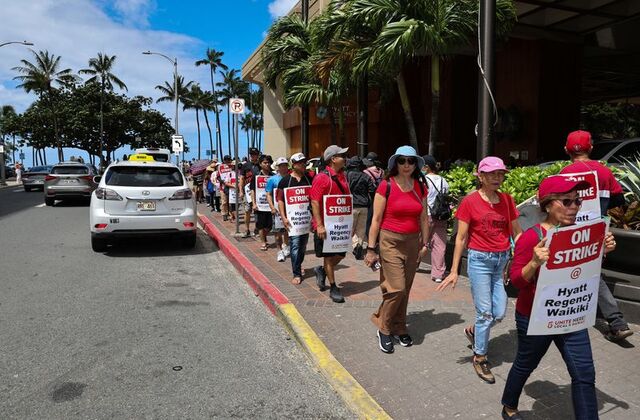Thousands of hotel workers across the United States have walked off the job, launching a multiday strike in several major cities in a bid to secure higher wages and increased staffing levels. The strike, which began on Sunday, involves workers at prominent hotel chains including Hyatt, Hilton, and Marriott, and spans 25 cities, including San Francisco, Seattle, Greenwich, Connecticut, and Honolulu. The labor action, organized by the hospitality union Unite Here, is expected to last between two and three days, strategically timed to coincide with Labor Day.
Background of the Strike
The strike was triggered by stalled contract negotiations between Unite Here and the hotel giants. The union represents a significant portion of the hospitality workforce in North America, and its demands center on issues that have long been festering in the industry: wages that have not kept pace with the rising cost of living, and staffing cuts that have significantly increased the workload for hotel employees. Workers argue that many of the cuts to staffing and guest services, initially introduced as a cost-saving measure during the COVID-19 pandemic, were never restored, even as the industry began to recover.
“During COVID, everyone suffered, but now the hotel industry is making record profits while workers and guests are left behind,” said Gwen Mills, International President of Unite Here, in a statement. “Many can no longer afford to live in the cities that they welcome guests to, and painful workloads are breaking their bodies. We won’t accept a ‘new normal’ where hotel companies profit by cutting their offerings to guests and abandoning their commitments to workers.”
Workers’ Demands and Industry Response
At the heart of the strike is the demand for higher wages and more staffing. Many hotel workers argue that despite industry claims of wage increases, their pay has not kept up with inflation, forcing them to take on multiple jobs to make ends meet. Steven Hufana, a prep cook at the Hilton Hawaiian Village in Honolulu, is one of the thousands of workers who voted to authorize the strike. He describes an environment where staff shortages have significantly increased workloads, leaving workers exhausted and struggling to maintain a decent quality of life.
“The workload becomes increased, and we just have little to no support to actually put forth a good product for the guests,” said Hufana. “Often times, we go home tired, overworked, and we just can’t even enjoy our lives after work.” He added that while his wages were once sufficient to support him, they have not kept pace with the rising cost of living in Hawaii. Hufana also noted that some of his family members, also in the hospitality industry, have left the island to seek better wages on the U.S. mainland.
Unite Here’s push for better conditions comes at a time when the hotel industry is reportedly facing a labor shortage. According to the American Hotel and Lodging Association (AHLA), the trade group representing major hotel operators, 86% of member hotels reported increasing wages during the first half of 2024. The association also noted that average wages for hotel workers have risen by 26% since the pandemic. Despite these increases, AHLA says that 80% of hotels continue to report staffing shortages, with 50% citing housekeeping as their greatest hiring need.
However, the industry’s challenges with staffing have not prevented it from achieving strong financial performance. AHLA projects that the average revenue per available room will reach a record $101.84 in 2024, driven by increased room rates and higher guest spending. This profitability has only fueled workers’ frustrations, as they see little of this financial success reflected in their paychecks or working conditions.
Potential Expansion and Historical Context
The strike has the potential to grow, with workers in additional cities, including Baltimore, New Haven, Connecticut, Oakland, California, and Providence, Rhode Island, poised to join if negotiations continue to stall. The current strike mirrors earlier actions taken by Unite Here, particularly a series of strikes in Southern California last summer that ultimately resulted in significant victories for hotel workers.
Earlier this year, after months of strikes that began in the summer of 2023, hotel workers at 34 hotels in Southern California secured substantial pay hikes, increased employer contributions to pensions, and fair workload guarantees. These wins have emboldened the union and set a precedent for current negotiations, though the path to a resolution in this round of negotiations remains uncertain.
Hyatt has indicated a willingness to continue negotiations, stating, “We look forward to continuing to negotiate fair contracts and recognize the contributions of Hyatt employees.” Marriott and Hilton, however, did not immediately respond to requests for comment.
Tiffany Ten Eyck, a spokesperson for Unite Here, emphasized that while negotiations will continue, the union and hotel operators “remain very far apart on the issues that matter most to hotel workers.”
Conclusion
As the strike continues, its impact is being felt not only by the striking workers but also by the broader hospitality industry and the thousands of travelers affected during one of the busiest weekends of the year. With no immediate resolution in sight, the strike could signal a prolonged period of labor unrest in the U.S. hotel industry, with potentially far-reaching consequences for workers, guests, and hotel operators alike. The outcome of these negotiations will likely set the tone for future labor relations in the hospitality sector, particularly as the industry navigates its post-pandemic recovery.



